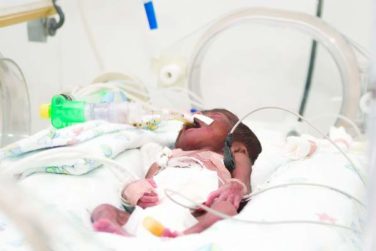AT THE AAD ANNUAL MEETING
SAN FRANCISCO (FRONTLINE MEDICAL NEWS) – An investigational interleukin-23 inhibitor for moderate to severe plaque psoriasis achieved almost twice the PASI 90 response rate of ustekinumab and generated no major safety signals, based on data from randomized trial of 166 patients.
At 12 weeks, 77% of patients treated with 90- or 180-mg doses of BI 655066 were clear or almost clear, compared with 40% of patients treated with weight-based ustekinumab (P < .0001), Dr. Kim A. Papp reported at the annual meeting of the American Academy of Dermatology.
Response to the 180-mg dose of BI 655066 was both early and durable, he noted. “At 4 weeks, we were starting to see these patients do very well. At week 12, almost 80% of patients who received the 180-mg dose achieved PASI 90, and that response was maintained through 24 weeks,” he said. In contrast, the 90-mg dose of BI 65506 was associated with a decline in PASI 90 response after week 16, added Dr. Papp of Probity Medical Research in Waterloo, Ontario.
Past studies have shown that IL-23 plays a key role in psoriasis by mediating the Th17 cell pathway. The BI 655066 agent is a monoclonal antibody that selectively targets IL23p19, while ustekinumab (STELARA) is an IL12/23 antagonist approved for treatment of moderate or severe plaque psoriasis or active psoriatic arthritis. To compare the two biologics, Dr. Papp and his associates randomized 166 patients with moderate or severe plaque psoriasis to subcutaneous treatment with BI 655066 (18 mg at baseline, 90 mg at baseline and week 4, or 180 mg at baseline and week 4) or weight-based ustekinumab (45 or 90 mg at baseline and week 4.) The patient cohorts were demographically similar, had comparable histories of exposure to anti–tumor necrosis factor agents, and their average baseline PASI scores were about 19 to 20, said Dr. Papp.
In all, 90% of patients treated with 90- or 180-mg doses of BI 655066 had achieved static Physicians Global Assessment scores of clear or almost clear at week 12, compared with 67.5% of patients who received ustekinumab, Dr. Papp reported. Furthermore, 46% of BI 655066 patients achieved PASI 100 (complete clearing) at week 12, compared with 17.5% of ustekinumab patients. At week 20, PASI 100 response rates were 62% for the 180-mg group, 53% for the 90-mg group, and 30% for the ustekinumab group, he said.
Rates of adverse events were low and similar for the treatment groups, said Dr. Papp. The most common adverse events were nasopharyngitis and headache, although some patients reported arthralgia and myalgia. The investigators identified no severe or serious treatment-related side effects, nor any sign that adverse effects were more common at higher treatment doses, Dr. Papp said.
Researchers are continuing to assess the safety and efficacy of BI 655066 in an open-label extension trial of patients with plaque psoriasis. That study is using week 48 PASI 90 response as its primary endpoint and will track adverse events for 24 months.
Boehringer Ingelheim funded the study. Dr. Papp disclosed reported relevant relationships with Boehringer Ingelheim and with several other pharmaceutical companies.



